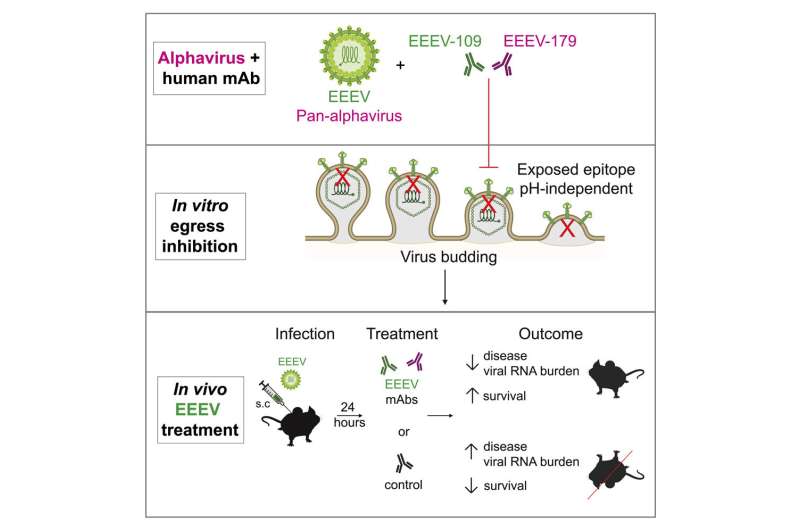Team isolates antibodies that target alphaviruses

A multi-institutional team led by researchers at Vanderbilt University Medical Center has isolated monoclonal antibodies that in laboratory and animal studies prevented infection by alphaviruses, including the often-lethal Eastern equine encephalitis virus (EEEV).
EEEV, which infects the central nervous system of humans, horses and other animals, is the most virulent encephalitic alphavirus. Although only a few human cases are reported annually in the United States, the fatality rate exceeds 30%, and there are no approved vaccines or antiviral drugs to treat it.
These results, reported in the current issue of the journal Cell, represent new hope for a way to prevent and treat mosquito-transmitted infections by this diverse family of viruses, which causes neurological (encephalitic) and musculoskeletal (arthritogenic) diseases in humans.
"We were gratified to isolate protective antibodies like this from the blood cells of survivors," said the paper's corresponding author, James Crowe Jr., MD, director of the Vanderbilt Vaccine Center, the Ann Scott Carell Chair and professor of Pediatrics and Pathology, Microbiology & Immunology at VUMC.
"These antibodies teach us how to make new vaccines to prevent brain infections, and the antibodies could be useful as drugs to prevent or treat infections," Crowe said.
In comparison, millions of people are infected annually by chikungunya, an alphavirus that causes fever and severe debilitating joint and muscle pain. Currently there is no targeted therapy for the disease, which is endemic in the Americas and Caribbean and is spreading outside the tropics.
Alphavirus infection occurs when a "spike" protein on the viral surface attaches to a target cell receptor in the body. At that point the virus is engulfed into the cell, where it hijacks the cell's genetic machinery to copy itself.
Although the body's immune system can produce neutralizing antibodies capable of inhibiting individual alphaviruses, broadly reactive antibodies that potentially can protect against both encephalitic and arthritogenic alphaviruses have not been reported. Until now.
From the blood of people who survived EEEV infection, Crowe and colleagues isolated monoclonal antibodies against the E1 spike proteins of a range of alphaviruses.
In laboratory and animal studies, the antibodies recognized alphavirus protein on the surfaces of infected cells and inhibited new virus from exiting the cells.
In a companion report published in the same issue of Cell, Michael Diamond, MD, Ph.D., and colleagues at Washington University School of Medicine in St. Louis, identified two human monoclonal antibodies that bound avidly to cells infected by arthritogenic or encephalitic alphaviruses.
Although the antibodies exhibited weak neutralizing activity against the viruses, they, like those identified by the VUMC researchers, recognized the highly conserved E1 alphavirus protein and protected against encephalitic and arthritogenic alphavirus infection and disease in animal studies.
Together, these two studies suggest that E1-specific monoclonal antibodies could form the basis for developing a broadly effective immunotherapy against alphavirus infection, the researchers concluded.
More information: Lauren E. Williamson et al, Therapeutic alphavirus cross-reactive E1 human antibodies inhibit viral egress, Cell (2021). DOI: 10.1016/j.cell.2021.07.033
Journal information: Cell
Provided by Vanderbilt University




















